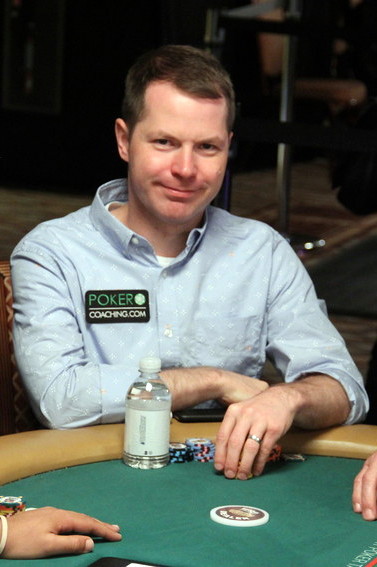






Poker Strategy With Jonathan Little: Knowing When To Give Up Against A Calling StationDevelop Your Poker Skills And Learn How To Crush Games At PokerCoaching.com/CardPlayerby Jonathan Little | Published: Nov 16, 2022 |
|
|

Jonathan Little
I was recently told about a hand that illustrates a key concept that you must master if you want to succeed at no-limit hold’em.
With blinds at 50-100 with 20,000 effective stacks early in a $500 buy-in tournament, a loose, splashy calling station raised to 300 and our Hero called on the button with 7 6
6 . The blinds folded.
. The blinds folded.
This is a perfectly fine and standard call. You should look to call with a wide range of suited connectors, suited aces, and big pairs before the flop when deep stacked, especially against someone who will be unable to fold any sort of marginal made hand after the flop.
While you will usually lose your 300 chips when you miss, when you flop a premium hand, you stand to win a lot of money. Three-betting is also a reasonable option, but if you know your opponent likes to call down, it is usually best to make a decent hand before loading money into the pot.
The flop came A 10
10 9
9 . The initial raiser checked.
. The initial raiser checked.
When the initial raiser checks, it is unlikely that he has a premium hand because most players (including calling stations) bet with their best hands. This likely “caps” the initial raiser’s range at top pair with a bad kicker.
Knowing this, should Hero make a bet, hoping to make the calling station fold an unpaired hand like K-Q or a weak pair like 5-5? I don’t think so. It is too likely that the calling station will call with any hand that he deems to have the least bit of potential. If you think your opponent will call your flop bet with hands like 5-5, you must be prepared to continue betting on the turn and the river to make him fold those hands, but that is also not a great idea, given they could easily have a hand like A-2 that will never fold to any amount of aggression. If the initial raiser was a more standard opponent, betting the flop with a junky draw would be perfectly acceptable because many players can be made to fold their hands as strong as top pair, weak kicker by the river if you apply enough aggression.
Hero checked behind. The turn was the J . The initial raiser checked again.
. The initial raiser checked again.
Especially when a jack (or king or queen) comes on the turn, Hero should be content to concede the pot. It is way too likely that the calling station now has some sort of marginal made hand that he will not fold to a turn and river bet.
Hero checked behind. The river was the 2 . The calling station checked.
. The calling station checked.
Sticking with the plan, giving up is the only play that makes sense when against a calling station. When you have a hand with no showdown value on the river, you should only bet when you expect to make your opponent fold a decent portion of his range.
 this spot, the only hands that a calling station will fold are unpaired hands such as K-3 (which may not even get played before the flop) and 5-4 (which 7-6 beats).
this spot, the only hands that a calling station will fold are unpaired hands such as K-3 (which may not even get played before the flop) and 5-4 (which 7-6 beats).
Against more competent players, betting the river is likely ideal, but against a calling station, giving up is the right play, even though it seems incredibly weak.
Hero checked behind. The calling station turned his K J
J up and won a tiny pot.
up and won a tiny pot.
This time the calling station had a hand he never planned to fold to any reasonable bet on any betting round. By simply giving up, Hero lost only three big blinds, which is a tiny portion of his 20,000 stack.
While it is far from exciting to simply check down and give up when you have nothing, that is usually the best play against someone who will rarely fold to your bets on boards where all reasonable hands have some showdown value.
 Jonathan Little is a two-time WPT champion with more than $7 million in live tournament earnings, best-selling author of 15 educational poker books, and 2019 GPI Poker Personality of the Year. If you want to increase your poker skills and learn to crush the games, check out his training site at PokerCoaching.com/cardplayer.
Jonathan Little is a two-time WPT champion with more than $7 million in live tournament earnings, best-selling author of 15 educational poker books, and 2019 GPI Poker Personality of the Year. If you want to increase your poker skills and learn to crush the games, check out his training site at PokerCoaching.com/cardplayer.
Features
Tournaments
Strategy
Commentary & Analysis